
Highway 61 Revisited is the sixth studio album by the American singer-songwriter Bob Dylan, released on August 30, 1965, by Columbia Records. Dylan continued the musical approach of his previous album Bringing It All Back Home (1965), using rock musicians as his backing band on every track of the album in a further departure from his primarily acoustic folk sound, except for the closing track, the 11-minute ballad "Desolation Row". Critics have focused on the innovative way Dylan combined driving, blues-based music with the subtlety of poetry to create songs that captured the political and cultural climate of contemporary America. Author Michael Gray argued that, in an important sense, the 1960s "started" with this album.
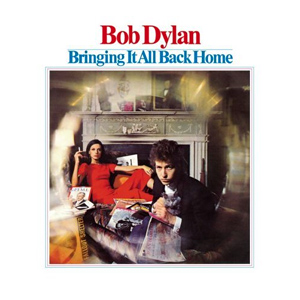
Bringing It All Back Home is the fifth studio album by the American singer-songwriter Bob Dylan, released in March 1965 by Columbia Records. In a major transition from his earlier sound, it was Dylan's first album to incorporate electric instrumentation, which caused controversy and divided many in the contemporary folk scene.

Another Side of Bob Dylan is the fourth studio album by the American singer and songwriter Bob Dylan, released on August 8, 1964, by Columbia Records.

"Mr. Tambourine Man" is a song written by Bob Dylan, released as the first track of the acoustic side of his March 1965 album Bringing It All Back Home. The song's popularity led to Dylan recording it live many times, and it has been included in multiple compilation albums. It has been translated into other languages and has been used or referenced in television shows, films, and books.

"Like a Rolling Stone" is a song by the American singer-songwriter Bob Dylan, released on July 20, 1965, by Columbia Records. Its confrontational lyrics originated in an extended piece of verse Dylan wrote in June 1965, when he returned exhausted from a grueling tour of England. Dylan distilled this draft into four verses and a chorus. "Like a Rolling Stone" was recorded a few weeks later as part of the sessions for the forthcoming album Highway 61 Revisited.

The Bootleg Series Vol. 7: No Direction Home: The Soundtrack is a compilation album by Bob Dylan. The fifth installment in the ongoing Bob Dylan Bootleg Series, it was released in 2005 in conjunction with the Martin Scorsese PBS television documentary on Dylan, No Direction Home, and was compiled with Scorsese's input. It features mostly previously unreleased material from Dylan's formative years to his rise as an international figure, from 1959 to his 1966 world tour.
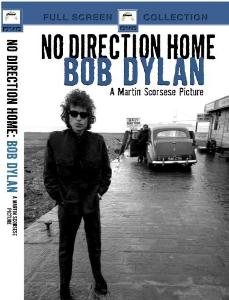
No Direction Home: Bob Dylan is a 2005 documentary film by Martin Scorsese that traces the life of Bob Dylan, and his impact on 20th-century American popular music and culture. The film focuses on the period between Dylan's arrival in New York in January 1961 and his "retirement" from touring following his motorcycle accident in July 1966. This period encapsulates Dylan's rise to fame as a folk singer and songwriter where he became the center of a cultural and musical upheaval, and continues through the electric controversy surrounding his move to a rock style of music.
"Tombstone Blues" is a song by American singer-songwriter Bob Dylan, which was released as the second track on his sixth studio album Highway 61 Revisited (1965). The song was written by Dylan, and produced by Bob Johnston. Critical interpretations of the song have suggested that the song references the Vietnam War and US President Lyndon Baines Johnson.
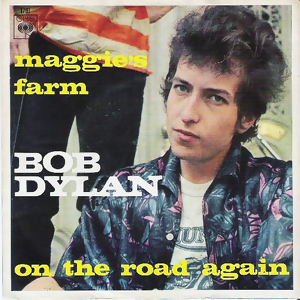
"Maggie's Farm" is a song written by Bob Dylan, recorded on January 15, 1965, and released on the album Bringing It All Back Home on March 22 of that year. Like many other Dylan songs of the 1965–66 period, "Maggie's Farm" is based on electric blues. It was released as a single in the United Kingdom on June 4, 1965, and peaked at No. 22 on the chart. Dylan only needed one take to record the song, as may be heard on the exhaustive 18-disc Collector's Edition of The Bootleg Series Vol. 12: The Cutting Edge 1965–1966, which includes every alternate take recorded during Dylan's 1965–1966 sessions but only the one version of "Maggie's Farm".
"It's All Over Now, Baby Blue" is a song written and performed by Bob Dylan and featured on his Bringing It All Back Home album, released on March 22, 1965, by Columbia Records. The song was recorded on January 15, 1965, with Dylan's acoustic guitar and harmonica and William E. Lee's bass guitar the only instrumentation. The lyrics were heavily influenced by Symbolist poetry and bid farewell to the titular "Baby Blue". There has been much speculation about the real life identity of "Baby Blue", with possibilities including Joan Baez, David Blue, Paul Clayton, Dylan's folk music audience, and even Dylan himself.
"To Ramona" is a song by American singer-songwriter Bob Dylan, first released on his fourth studio album, Another Side of Bob Dylan (1964). The song was written by Dylan, and produced by Tom Wilson. The lyrics were started at the May Fair Hotel in London in May 1964, and finished during a week-long stay in the Greek village of Vernilya later that month. Dylan recorded all the tracks for the album, including the song, in a single three-hour session on June 9, 1964, at Studio A, Columbia Recording Studios, New York. Its narrator advises Ramona, who is preparing to return to "the South", not to follow the advice of others. Critics have suggested several different people as inspirations for the song, including Joan Baez, Suze Rotolo, and Sara Lownds.
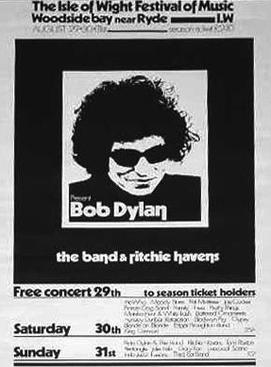
The 1969 Isle of Wight Festival was held on 29–31 August 1969 at Wootton Creek, on the Isle of Wight. The festival attracted an audience of approximately 150,000 to see acts including Bob Dylan, the Band, the Who, Free, Joe Cocker, the Bonzo Dog Band and the Moody Blues. It was the second of three music festivals held on the island between 1968 and 1970. Organised by Rikki Farr, Ronnie and Ray Foulk's Fiery Creations, it became a legendary event, largely owing to the participation of Dylan, who had spent the previous three years in semi-retirement. The event was well managed, in comparison to the recent Woodstock Festival, and trouble-free.
"It Takes a Lot to Laugh, It Takes a Train to Cry" is a song written by Bob Dylan, that was originally released on his album Highway 61 Revisited. It was recorded on July 29, 1965. The song was also included on an early, European Dylan compilation album entitled Bob Dylan's Greatest Hits 2.
The Other Side of the Mirror: Bob Dylan at the Newport Folk Festival is a 2007 documentary film about Bob Dylan's appearances at the Newport Folk Festival in three successive years: 1963, 1964, and 1965, directed by Murray Lerner.

The soundtrack album for the Bob Dylan biopic I'm Not There was released as a double CD on October 30, 2007. It features only one recording by Dylan himself—his previously unreleased recording of the title song "I'm Not There" recorded during The Basement Tapes' sessions in 1967—plus various other artists' recordings of songs written by Dylan. These CDs do not contain the movie sound track. Fragments from less than half of the titles are heard in the film, which features more of Dylan's own recordings. The end credits relay a complete list of music heard in the film.
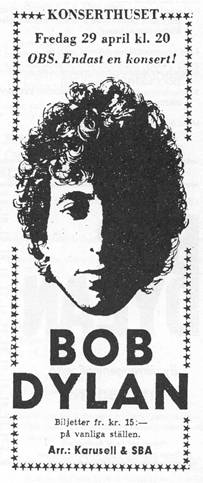
The Bob Dylan World Tour 1966 was a concert tour undertaken by the American musician Bob Dylan, from February to May 1966. Dylan's 1966 World Tour was notable as the first tour where Dylan employed an electric band backing him, following him "going electric" at the 1965 Newport Folk Festival. The musicians Dylan employed as his backing band were known as the Hawks, who later became famous as the Band.
Robert J. Gregg was an American musician who performed as a drummer and record producer. As a drum soloist and band leader he recorded one album and several singles, including one Top 40 single in the United States. But he is better known for his work as a drummer on several seminal 1960s songs, including Bob Dylan's "Like a Rolling Stone" and Simon and Garfunkel's "The Sound of Silence". He was also temporarily a member of the Hawks, which later became known as the Band.
Bob Dylan bootleg recordings are unreleased performances by American singer-songwriter Bob Dylan, that have been circulated throughout the public without undergoing an official, sanctioned release. It is commonly misconceived that bootlegs are only restricted to audio, but bootleg video performances, such as Dylan's 1966 film Eat the Document, which remains officially unreleased, are considered to be bootlegs. Dylan is generally considered to be the most bootlegged artist in rock history, rivaled only by the Grateful Dead.

The Bob Dylan World Tour 1978 was a concert tour by American singer-songwriter Bob Dylan. In 1978, Dylan embarked on a year-long world tour, performing 114 shows in Asia, Oceania, North America and Europe, to a total audience of two million people.
Bob Dylan is an American musician, singer-songwriter, music producer, artist, and writer. He has been an influential figure in popular music and culture for more than five decades. Much of his most celebrated work dates from the 1960s when he was an informal chronicler and a seemingly reluctant figurehead of social unrest.












